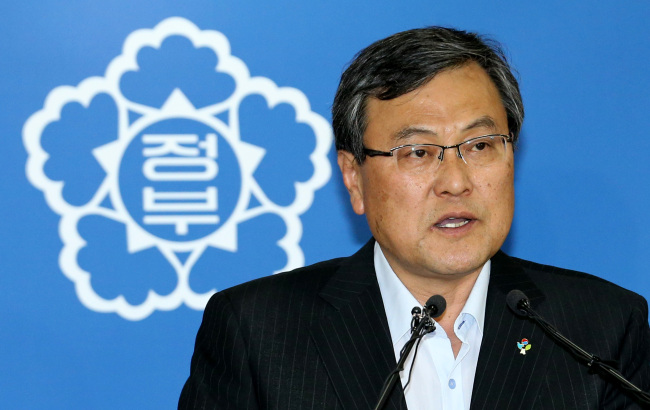Korea to improve venture ecosystem
Minister Choi says ‘creative economy’ measures are hoped to generate 650,000 jobs
By Park Hyung-kiPublished : June 5, 2013 - 20:16
The Ministry of Science, ICT and Future Planning said Wednesday that it would lay the foundations for a sound venture ecosystem that can give every Korean the opportunity to turn innovative and creative ideas into lucrative businesses.
Science and ICT Minister Choi Mun-kee said that the government’s incentives and deregulations to promote start-ups would boost job creation and national competitiveness.
The Science and ICT ministry said it hoped to create about 650,000 jobs through these measures supporting the innovative industries, and increase globally professional and creative human resources for growth.
“Korea is facing limits with its strategy as a ‘follower’ (of advanced economies),” Choi said. “Korea must abandon its old ways of copying and applying (other technologies) and transform into a country that can lead with creative ideas.”
Science and ICT Minister Choi Mun-kee said that the government’s incentives and deregulations to promote start-ups would boost job creation and national competitiveness.
The Science and ICT ministry said it hoped to create about 650,000 jobs through these measures supporting the innovative industries, and increase globally professional and creative human resources for growth.
“Korea is facing limits with its strategy as a ‘follower’ (of advanced economies),” Choi said. “Korea must abandon its old ways of copying and applying (other technologies) and transform into a country that can lead with creative ideas.”

Korea, which ranks among the bottom OECD countries in terms of creativity, can no longer rely on its traditional industries such as steel, semiconductors and shipbuilding for growth, with emerging economies catching up fast in those areas.
Korea must focus on innovation through the convergence of IT, software, culture and arts that can boost a wide range of sector growth such as the environment, agriculture, infrastructure and health care, the minister said.
This follows last month when the Ministry of Strategy and Finance unveiled a set of measures including tax incentives for the development of a creative economy by supporting venture start-ups.
It is now up to the Science and ICT Ministry to ensure those measures, suggested by other agencies such as the Finance Ministry and Fair Trade Commission, are coherently implemented for the creation of a sustainable ecosystem based on three long-term visions.
Those visions are: boosting jobs, strengthening Korea’s global leadership and establishing a society that respects creativity.
Citing the examples of Silicon Valley and Israel, the Korean government wants to end negative social perceptions of venture entrepreneurship by creating an environment where people are unafraid to launch start-ups. This would involve those who fail not being blamed by society, but given another chance as long as they have creative ideas for a new business.
The government will seek to help venture entrepreneurs secure investments from angel investors or crowd-funding, rather than loans with collateral.
The Finance Ministry will allow investors to receive an income tax deduction of up to 50 percent from currently 30 percent, while the FTC will relax its antitrust rules governing mergers and acquisitions of start-ups by conglomerates, as announced last month.
Current rules made big businesses reluctant to expand by acquiring smaller firms including start-ups as they generally faced antitrust measures.
The government will deregulate to increase venture M&As, which are one of ways for investors to retrieve their investments in start-ups, the other being stock floatation.
The Finance Ministry and the Financial Services Commission have come up with eased rules for listing on the KONEX, while tax authorities will provide tax benefits to investors investing in venture firms listed on the exchange.
By Park Hyong-ki (hkp@heraldcorp.com)




![[KH Explains] No more 'Michael' at Kakao Games](http://res.heraldm.com/phpwas/restmb_idxmake.php?idx=644&simg=/content/image/2024/04/28/20240428050183_0.jpg&u=20240428180321)












![[Herald Interview] Mistakes turn into blessings in street performance, director says](http://res.heraldm.com/phpwas/restmb_idxmake.php?idx=652&simg=/content/image/2024/04/28/20240428050150_0.jpg&u=20240428174656)
